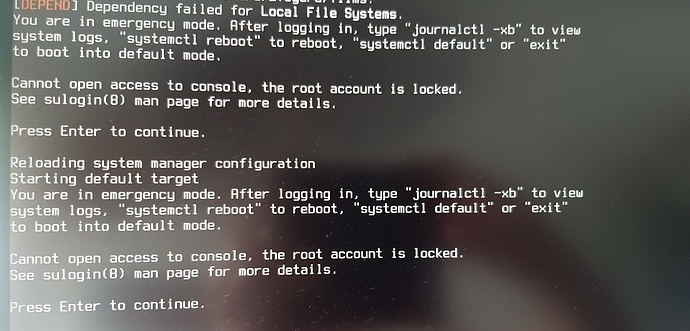I’m on Manjaro GNOME, testing branch. After the update, I got this:
I couldn’t get a TTY so I chrooted with a live USB then commented that line in
/etc/fstab
# /etc/fstab: static file system information.
#
# Use 'blkid' to print the universally unique identifier for a device; this may
# be used with UUID= as a more robust way to name devices that works even if
# disks are added and removed. See fstab(5).
#
# <file system> <mount point> <type> <options> <dump> <pass>
UUID=147B-872D /boot/efi vfat umask=0077 0 2
UUID=96e4e9a5-6c82-456f-a6c0-974752dde37e / ext4 defaults,discard,noatime 0 1
#tmpfs /tmp tmpfs defaults,discard,noatime,mode=1777 0 0
UUID=53c0ad2d-3022-4391-9ac6-24f3541b9151 /mnt/HDD ext4 nosuid,nodev,nofail,x-gvfs-show 0 0
Now, I am able to boot but how can I fix this issue? I want to keep /tmp mounted.
inxi -Fyzx0
Kernel: 5.9.16-1-MANJARO x86_64 bits: 64 compiler: gcc v: 10.2.0
Desktop: GNOME 3.38.2 Distro: Manjaro Linux
Machine:
Type: Desktop Mobo: Gigabyte model: B450M S2H v: x.x serial: <filter>
UEFI: American Megatrends v: F51 date: 07/29/2020
CPU:
Info: 6-Core model: AMD Ryzen 5 3600 bits: 64 type: MT MCP arch: Zen 2
rev: 0 L2 cache: 3 MiB
flags: avx avx2 lm nx pae sse sse2 sse3 sse4_1 sse4_2 sse4a ssse3 svm
bogomips: 86277
Speed: 2594 MHz min/max: 2200/3600 MHz boost: enabled Core speeds (MHz):
1: 2594 2: 1917 3: 1993 4: 1954 5: 1877 6: 2784 7: 1873 8: 1875 9: 2551
10: 2091 11: 1962 12: 2610
Graphics:
Device-1: AMD Ellesmere [Radeon RX 470/480/570/570X/580/580X/590]
vendor: Sapphire Limited driver: amdgpu v: kernel bus ID: 09:00.0
Display: wayland server: X.org 1.20.10 compositor: gnome-shell
driver: amdgpu note: n/a (using device driver) - try sudo/root
resolution: <missing: xdpyinfo>
OpenGL: renderer: Radeon RX 590 Series (POLARIS10 DRM 3.39.0
5.9.16-1-MANJARO LLVM 11.0.0)
v: 4.6 Mesa 20.3.2 direct render: Yes
Audio:
Device-1: AMD Ellesmere HDMI Audio [Radeon RX 470/480 / 570/580/590]
vendor: Sapphire Limited driver: snd_hda_intel v: kernel bus ID: 09:00.1
Device-2: AMD Starship/Matisse HD Audio vendor: Gigabyte
driver: snd_hda_intel v: kernel bus ID: 0b:00.4
Sound Server: ALSA v: k5.9.16-1-MANJARO
Network:
Device-1: Realtek RTL8111/8168/8411 PCI Express Gigabit Ethernet
vendor: Gigabyte driver: r8169 v: kernel port: f000 bus ID: 08:00.0
IF: enp8s0 state: up speed: 1000 Mbps duplex: full mac: <filter>
Drives:
Local Storage: total: 1.35 TiB used: 113.79 GiB (8.3%)
ID-1: /dev/sda vendor: Kingston model: HyperX Fury 3D 480GB size: 447.13 GiB
ID-2: /dev/sdb vendor: Western Digital model: WD10EZEX-21WN4A0
size: 931.51 GiB
Partition:
ID-1: / size: 191.64 GiB used: 18.56 GiB (9.7%) fs: ext4 dev: /dev/sda3
ID-2: /boot/efi size: 114.2 MiB used: 46.7 MiB (40.9%) fs: vfat
dev: /dev/sda1
Swap:
Alert: No Swap data was found.
Sensors:
System Temperatures: cpu: 35.1 C mobo: N/A gpu: amdgpu temp: 32.0 C
Fan Speeds (RPM): N/A gpu: amdgpu fan: 967
Info:
Processes: 308 Uptime: 16m Memory: 15.65 GiB used: 1.91 GiB (12.2%)
Init: systemd Compilers: gcc: 10.2.0 Packages: 1042 Shell: Zsh v: 5.8
inxi: 3.2.01 ```

